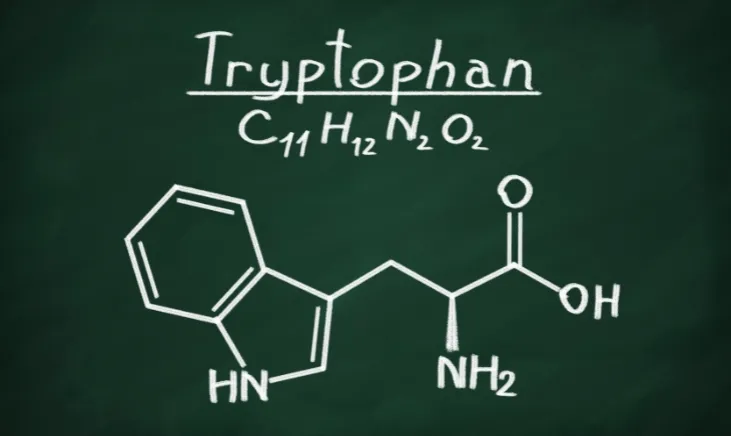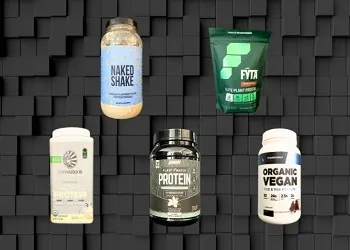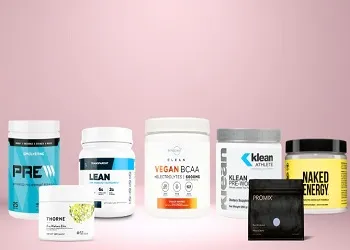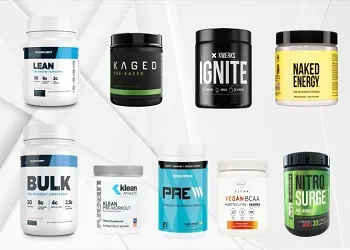Tryptophan is one of the essential amino acids (EAAs) that is crucial for sleep, mood, mental health, and more. Including this amino acid in your diet regularly is key to optimizing your overall health and wellness.
We know it is important, but which foods contain tryptophan? In this article, we dive into what it is, why it’s necessary, and which foods have tryptophan so you can make sure you are getting the tryptophan you need daily.
Table of Contents
Short Summary
- Tryptophan is one of the essential amino acids that is needed for sleep, mood, and mental health, among many other functions within our bodies.
- Foods that contain tryptophan include turkey, chicken, pork, ham, lamb, duck, salmon, tuna, eggs, beans, pumpkin seeds, oatmeal, cheese, and milk.
- Tryptophan supplements are available, but they are likely not necessary with how accessible food sources of tryptophan are.
What is Tryptophan?
Tryptophan is one of the EAAs that is needed for many functions within the human body. Our bodies cannot produce it so it is essential that we consume enough of it in our diet regularly.
How Tryptophan Works in the Body
Tryptophan is needed for growth and development at all ages. It is also required to produce proteins, enzymes, and neurotransmitters that allow our bodies to function properly.
Tryptophan is used to make both serotonin and melatonin. It helps boost serotonin levels, which regulate our sleep, improve mood, control appetite, and alter how we feel pain. It’s also needed for melatonin, which can help improve our sleep cycle, especially if we currently get insufficient sleep.
Our livers use it to produce vitamin B3, frequently referred to as niacin. Niacin is needed for DNA production and energy metabolism.
Health Benefits of Tryptophan
Tryptophan is a key amino acid in many ways, but some of the main health benefits of tryptophan include:
- Sleep: Tryptophan can help improve sleep because of its role in melatonin production. Sleep quality is one of the benefits of l-tryptophan.
- Depression and anxiety: A high tryptophan diet has been associated with improvements in depression and anxiety symptoms.
- Mood: It is needed for the neurotransmitter serotonin. Our bodies use it for serotonin production and to maintain serotonin levels. Serotonin is necessary for mood regulation.
Other studies have shown it may play a role in other health conditions including:
- Autism
- Cardiovascular disease (heart disease)
- Chronic kidney disease
- Inflammatory bowel disease
- Multiple sclerosis
- Severe premenstrual syndrome
How to Get the Essential Amino Acid Tryptophan
Tryptophan-rich foods are the best source of tryptophan. The Estimated Average Requirement (EAR) for tryptophan for adults is 4 milligrams per kilogram of body weight daily. That means a 150-pound adult needs about 275 milligrams, and a 200-pound adult needs about 364 milligrams of tryptophan each day. The tolerable upper intake levels (UL) for tryptophan is 4.6 grams (4600 milligrams) per day, which means it can be harmful to consume more than this.
If you’re still wondering which foods are high in tryptophan to help you meet your daily needs, read on.
/image
Foods With Tryptophan
Some foods that contain high amounts of tryptophan include turkey, chicken, pork, ham, lamb, duck, salmon, tuna, eggs, beans, pumpkin seeds, oatmeal, cheese, and milk.
Does Turkey Have Tryptophan?
Yes, turkey is one of the best dietary sources of tryptophan. We often hear that turkey is one of the foods highest in tryptophan, which is why people claim they are sleepy after eating turkey at a Thanksgiving meal.
How Much Tryptophan is in Turkey?
One four-ounce serving of turkey contains 329 milligrams, which meets the daily requirements for many individuals. If you’re really looking to maximize your intake, choose light meat, which has more of it than dark meat.
Does Chicken Have Tryptophan?
We always hear about tryptophan in turkey, but what about chicken? Is there tryptophan in chicken? Yes, chicken is another food high in tryptophan.
Now, you may be wondering, does chicken have more tryptophan than turkey? The answer is yes, in fact, it does.
How Much Tryptophan is in Chicken?
One four-ounce serving of chicken contains 345 milligrams, which again meets the daily requirements for many individuals. Also remember, light meat contains more than dark.
Does Beef Have Tryptophan?
If poultry is so high in tryptophan, are other meats, too? Unfortunately, not so much. While beef does contain some of the amino acid tryptophan, it contains far less than chicken and turkey.
How Much Tryptophan is in Beef?
Four ounces of beef only contains about 100 milligrams. This is still about one-third of the average person’s daily needs but not quite as much as you would get from a serving of poultry.
Does Pork Have Tryptophan?
Yes, pork is another food rich in tryptophan.
How Much Tryptophan is in Pork?
Four ounces of pork contains about 383 milligrams, which ranks it even higher than chicken or turkey on the list of tryptophan-containing foods.
Does Ham Have Tryptophan?
If pork is a food with tryptophan, ham has to be, too, right? That is correct.
How Much Tryptophan is in Ham?
Ham contains 284 milligrams per four ounces, which again, meets most of your daily needs.
Does Lamb Have Tryptophan?
Lamb is another meat that ranks at the top of the list of foods that have tryptophan.
How Much Tryptophan is in Lamb?
Lamb contains 325 milligrams in each four-ounce serving.
Does Duck Have Tryptophan?
Duck, like chicken and turkey, is another high tryptophan food.
How Much Tryptophan is in Duck?
One four-ounce serving of duck contains 262 milligrams.
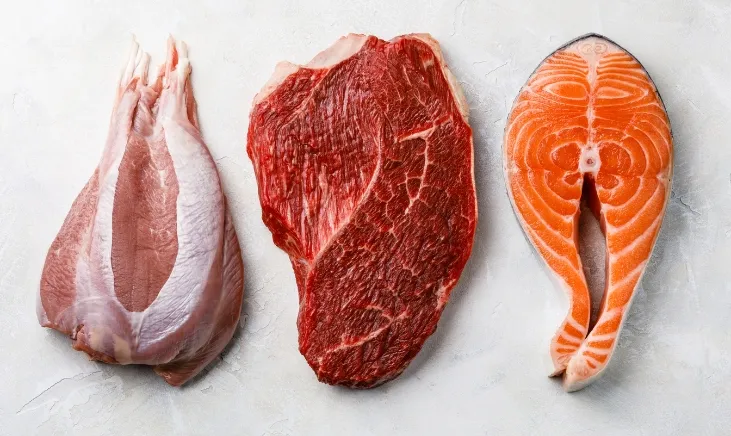
Does Salmon Have Tryptophan?
Yes, salmon is another good source.
How Much Tryptophan is in Salmon?
Salmon contains 237 milligrams per four-ounce serving.
Does Tuna Have Tryptophan?
Yes, tuna is another fish on the list of foods high in tryptophan.
How Much Tryptophan is in Tuna?
One can of tuna contains 472 milligrams, one of the highest tryptophan levels in any food.
Do Eggs Have Tryptophan?
Yes, eggs are another good source of tryptophan.
How Much Tryptophan is in Eggs?
Each egg contains 76 milligrams, so consuming three eggs for breakfast would give you 228 milligrams in one meal.
Do Beans Have Tryptophan?
If you’re wondering which food is highest in tryptophan, a certain type of bean is your answer. Most varieties of beans are great sources.
How Much Tryptophan is in Beans?
Different beans contain different levels. Some of the most common include:
- Chickpeas contain 400 milligrams per cup.
- Kidney beans contain 513 milligrams per cup.
- Pinto beans contain 457 milligrams per cup.
Do Pumpkin Seeds Have Tryptophan?
Yes, pumpkin seeds and other squash seeds are also good sources.
How Much Tryptophan is in Pumpkin Seeds?
Each cup of pumpkin seeds contains 209 milligrams.
Does Oatmeal Have Tryptophan?
Yes, oatmeal is on the list of foods high in tryptophan.
How Much Tryptophan is in Oatmeal?
One cup of oats contains 365 milligrams.
Does Peanut Butter Have Tryptophan?
Peanut butter also contains tryptophan, but again, not as much as many other foods on this list.
How Much Tryptophan is in Peanut Butter?
A two-tablespoon serving of peanut butter contains 74 milligrams.
Does Milk Have Tryptophan?
Yes, milk also contains tryptophan. However, not as much as cheese.
How Much Tryptophan is in Milk?
One cup of milk contains 105 grams.
Does Cheese Have Tryptophan?
Yes, cheese is a great source of tryptophan.
How Much Tryptophan is in Cheese?
Cheese, specifically cheddar cheese, contains 309 milligrams per one-half cup, making it one of the top foods with high levels of tryptophan.
Does Yogurt Have Tryptophan?
Yogurt does contain some tryptophan but not quite as much as the previously discussed foods.
How Much Tryptophan is in Yogurt?
Each cup of Greek yogurt contains 75 milligrams.
Does Soy Milk Have Tryptophan?
Yes, it does contain tryptophan, but not as much as cow’s milk.
How Much Tryptophan is in Soy Milk?
Each cup of soy milk contains 92 milligrams.
Does Oat Milk Have Tryptophan?
Oat milk has very little tryptophan.
How Much Tryptophan is in Oat Milk?
Each cup of oat milk provides about 22 grams, which is less than ten percent of your daily needs.
Does Almond Milk Have Tryptophan?
No, almond milk contains almost no tryptophan.
How Much Tryptophan is in Almond Milk?
One cup of almond milk contains less than 3 milligrams.
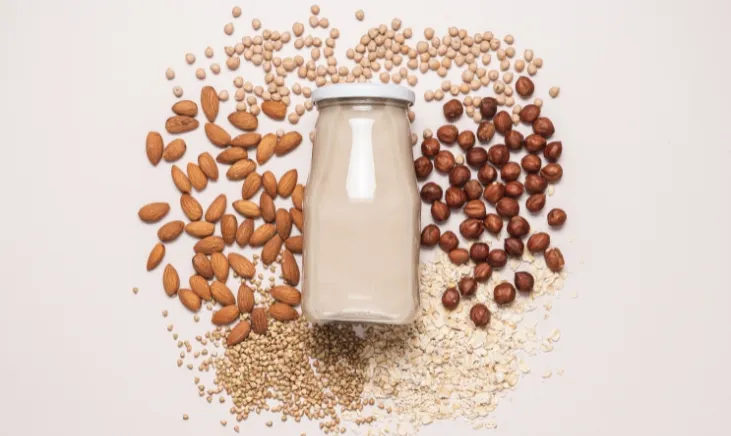
Fruits with Tryptophan
Do Bananas Have Tryptophan?
No, bananas are not a great source.
How Much Tryptophan is in Bananas?
One large banana only contains about 12 milligrams, which is far less than most of the foods discussed above.
Do Cherries Have Tryptophan?
Cherries also do not have much tryptophan.
How Much Tryptophan is in Cherries?
Each cup of cherries only contains 12 milligrams.
Do Onions Have Tryptophan?
Onions contain very small amounts.
How Much Tryptophan is in Onions?
Each cup of onion has a tryptophan content of 22 milligrams.
Tryptophan Supplements
Tryptophan supplements are available, if you feel the need to supplement your intake. Another option for tryptophan supplementation is to take an amino acid supplement that contains tryptophan along with the other amino acids.
Should I Take Tryptophan Supplements?
As a registered dietitian I always encourage a food first approach, which aims to get as many of the nutrients you need from eating foods, without supplements. However, some nutrients are harder to get than others, which warrants supplementation.
Tryptophan deficiency is rare and not a public health concern because it is one of the easier amino acids to get enough of in our diet regularly, especially if you are eating foods that contain animal protein and/or plant-based proteins. As you just read, various foods contain your entire daily need in just one serving. Pairing a few of these together is another way to quickly and easily boost your intake.
If you do choose to take tryptophan supplements, remember to avoid consuming more than 4.6 grams (4600 milligrams) daily, which is the UL. This limit takes into account both the many foods high in tryptophan and purified tryptophan supplements.
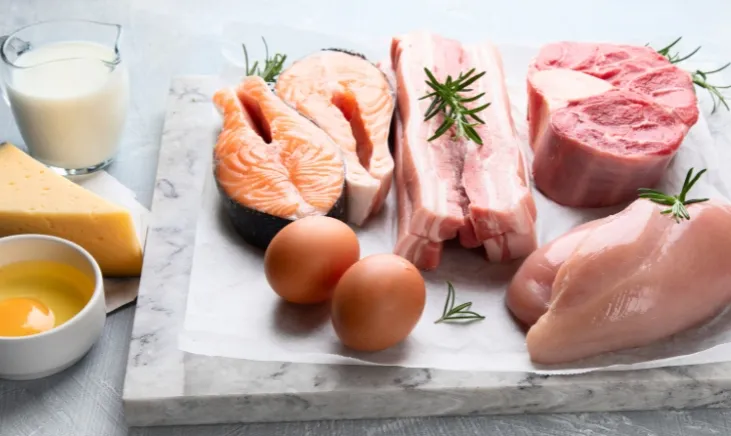
Summary
Foods with tryptophan are everywhere, so getting to the daily recommended 4 milligrams per kilogram of body weight is not hard. However, if you are looking to boost your intake, focusing on high-tryptophan foods can help you do so.
To recap which foods are high in tryptophan, here is a quick list:
- Turkey
- Chicken
- Pork
- Ham
- Lamb
- Duck
- Salmon
- Tuna
- Eggs
- Beans
- Pumpkin seeds
- Oatmeal
- Cheese
- Milk
Tryptophan supplements and general amino acid supplements are available, but with so many common high-tryptophan foods, they are not really necessary for most individuals.
Frequently Asked Questions
Which foods are high in tryptophan for sleep?
As we discussed, most meats, fish, eggs, milk, cheese, beans, pumpkin seeds, and oats are full of tryptophan. If you are looking for foods high in tryptophan to have as a bedtime snack, try a bowl of oatmeal cooked in milk with pumpkin seeds on top.
Does eating turkey make you sleepy?
Tryptophan is linked with sleep through melatonin. Turkey contains tryptophan, so this does seem to make sense. However, a recent study found that while tryptophan helps prevent you from waking up from sleep prematurely, it doesn’t impact the time it takes to fall asleep or other sleep outcomes.
Can eating foods high in tryptophan make a difference in my mood?
Yes, tryptophan is needed for serotonin synthesis, which is necessary for mood regulation. A boost in serotonin levels has a positive effect on mood, while low serotonin levels can negatively impact your mood.
Which other amino acids can help with sleep?
Glycine, glutamine, and arginine are all also linked to improvements in sleep and sleep disorders.
